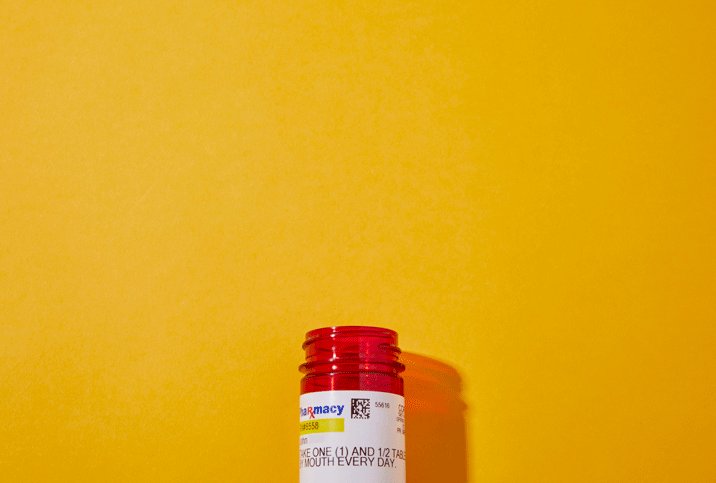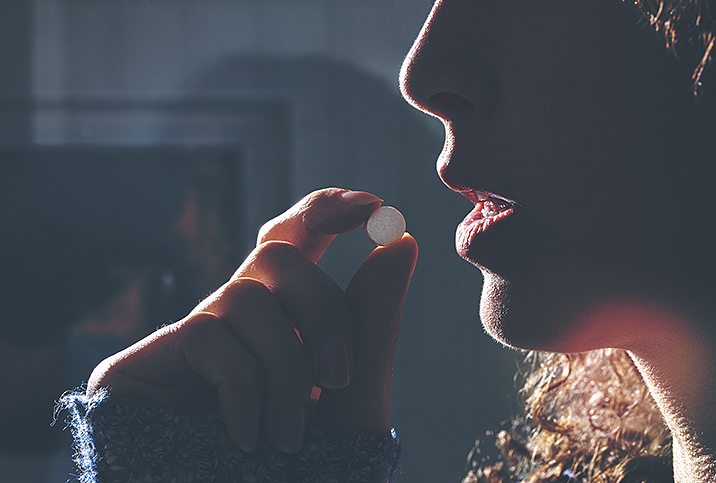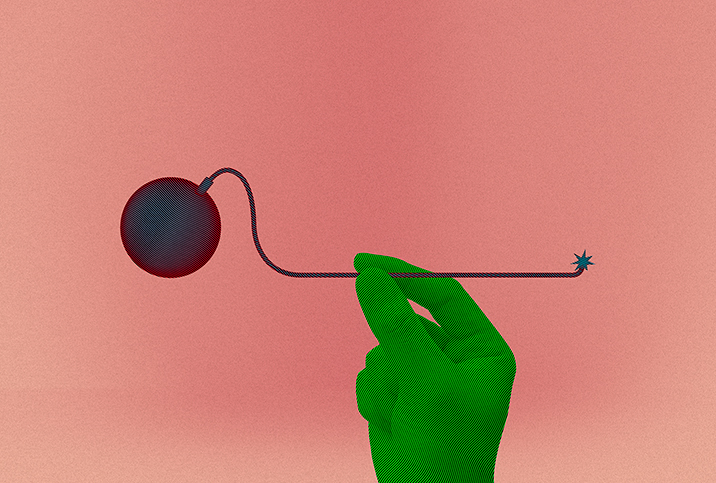Start Living Your (Sex) Life in the Slow Lane

The world of discovery has no shortage of happy accidents. Play-Doh started as a dirt-cleaning substance. Penicillin exists because a scientist let a Petri dish get moldy. A candy bar that melted during research into radar technology led to the microwave oven.
More recently, the medical community discovered antidepressant medication does more than treat depression; it can counteract premature ejaculation (PE).
That's right, the same pills people take to treat depression can apparently be used by men struggling with PE, defined as ejaculation that occurs sooner than desired by one or both partners during sex, according to the American Urological Association.
Delayed ejaculation is a common complaint of patients taking antidepressants. After conducting research, urologists began using said drugs to treat PE. They sometimes prescribe sertraline hydrochloride (Zoloft), fluoxetine (Prozac), paroxetine (Paxil), escitalopram (Lexapro) and other antidepressants "off-label," meaning the drugs have not been approved by the Food and Drug Administration (FDA) for the treatment of premature ejaculation.
"For the most part, it is nonaddictive, safe and effective," said Seth Cohen, M.D., an assistant professor of urology and the director of sexual medicine at NYU Langone Health in New York City, adding that he uses only low doses of antidepressants for PE patients. "This is a godsend medication for men suffering from premature ejaculation."
What the research says
Medical literature supports the effectiveness of antidepressants for PE. A small clinical trial from 1998 observed the effects of Zoloft on 46 men who reported experiencing premature ejaculation. Researchers found a 25mg dose lengthened the mean ejaculatory interval during intercourse from one minute to more than seven and a half minutes, and the interval increased to 13 minutes with 50mg, and more than 16 minutes with 100mg.
A larger study from 2006 found Zoloft helped delay ejaculation in men with PE, too. However, about 66 percent of the men experienced a relapse of PE within six months upon stopping the medication.
Some antidepressants may be better than others. One randomized study found paroxetine to be more effective than citalopram (Celexa) in treating premature ejaculation.
How does it work?
The most commonly prescribed antidepressants belong to a class of drugs known as selective serotonin reuptake inhibitors (SSRIs). While it's not fully known why these drugs delay ejaculation, it's believed serotonin, a neurotransmitter (chemical messenger), plays a role. SSRIs increase the levels of serotonin in the brain.
"Serotonin affects a lot of things, including mood and time of ejaculation," explained Britney Blair, Psy.D., a San Francisco-based clinical psychologist and co-founder of the sexual health app Lover. "More serotonin equals longer time to ejaculate; less serotonin equals shorter time to ejaculate. So we think that that could be a factor."
Blair added that the mechanism of SSRIs is likely multifactorial, and the serotonin aspect may just be one physiological element.
'More serotonin equals longer time to ejaculate; less serotonin equals shorter time to ejaculate.'
"It's not well understood," Cohen said. "But in the same way that it improves depression and anxiety that we don't really understand, it also delays ejaculation. And the higher the dosage you go, likely the more delay in ejaculation."
The neuropharmacology behind SSRIs is a "best guess" at this point, according to Martin Kathrins, M.D., an assistant professor of surgery at Harvard Medical School and a urologist at Brigham and Women's Hospital in Boston.
"It's a central suppressive mechanism," he explained. "It probably has something to do with the dopaminergic pathway that they work through. It may have to do with some of the prolactin levels that are induced."
High levels of prolactin, a hormone produced by the pituitary gland, have been associated with delayed orgasm, whereas low levels have been associated with premature ejaculation.
How often should you take it?
Antidepressants can be taken for PE either on demand or daily. Doctors have differing thoughts on the dosage.
Kathrins said daily use is more effective.
"I've found them to be very effective and well-tolerated," he said, adding that some of his PE patients have stayed on antidepressants for years.
Neel Parekh, M.D., a clinical assistant professor of urology at the Cleveland Clinic, said he's generally not comfortable putting PE patients on a daily dose of antidepressants. He prefers they consult their primary care physician or psychiatrist about that type of prescription.
"I'm willing to try on-demand dosing, not a pill that they take every day, but essentially prior to sexual activity," he said.
Daily antidepressants—paroxetine, clomipramine, sertraline, fluoxetine and citalopram—typically take five to 10 days to begin working. For on-demand use—a drug called dapoxetine is the go-to for this dosing program—Parekh recommends taking them at least one to two hours before having sex.
Blair said her philosophy is to "start low, go slow," because everybody has a different experience with medications. How one man responds to an antidepressant may be drastically different from how another man of the same weight and age responds.
Potential drug interactions and side effects
Parekh said it's important for doctors to review the other medications being used by PE patients to avoid possible interactions with SSRIs. Medications that may interact with SSRIs include nonsteroidal anti-inflammatory drugs (NSAIDs); antiplatelets, used to prevent blood clots; lithium, used to treat bipolar disorder and severe depression; theophylline, used to treat asthma; and triptans, used to treat migraines.
While SSRIs for both depression and premature ejaculation are safe and effective for most patients, some people do experience side effects, including dry mouth, dizziness, headache, nausea, fatigue, anxiety, suicidal behavior and serotonin syndrome, a life-threatening condition caused by too much serotonin in the body.
"You don't want to cause a side effect like serotonin syndrome, which can be a big issue," Parekh said. "It's not something we take lightly."
Kathrins pointed out SSRIs have a "black box warning" about the risk of suicidal thoughts and behaviors, and this possibility should be brought to the patient's attention.
"We're generally not treating men with major depression; we're treating men with rapid ejaculation without a psychiatric diagnosis," Kathrins said. "If there is a psychiatric diagnosis, that's different. You need to have a different approach. You may want to involve the patient's neuropsychiatrist in prescribing that medication to make sure it's safe."
What are the sexual side effects?
In addition to delayed ejaculation, sexual side effects of SSRIs may include decreased desire, erectile dysfunction (ED) and anejaculation, which is the inability to ejaculate semen.
In fact, most SSRIs can cause a decline in libido, Blair said, something she likens to trading problems: Men may be able to last longer, but sexual desire dips.
Sometimes orgasm can be so delayed that men, including those on SSRIs for depression and PE, have trouble climaxing in a timely manner.
"Some men may go 15 to 20 minutes, and you give them an SSRI because they're depressed, and now they're going 30 to 40 minutes before they're ejaculating," Cohen said. "These guys are really pissed off because that takes too long to ejaculate for them."
Most SSRIs can cause a decline in libido. Men may be able to last longer, but sexual desire dips.
Blair pointed out sexual side effects often persist even after the discontinuation of the SSRI.
"The impact on lowering the libido could be something that's ongoing, which is very distressing for people," she said.
Data suggests that taking an erectile dysfunction medication known as a phosphodiesterase type 5 (PDE5) inhibitor (e.g., sildenafil, tadalafil) on a daily basis can be extremely helpful, Blair said. If the SSRI causes low libido and ED, it can completely wreck someone's sexual confidence, she said. Adding a low-dose PDE5 inhibitor can resolve the ED and potentially the libido, as well, she said.
"You're getting a medication to solve a problem created by a medication," Blair said.
Due to the potential side effects, Blair generally recommends medication only after behavioral techniques, such as the start-stop or squeeze methods, have been tried.




















